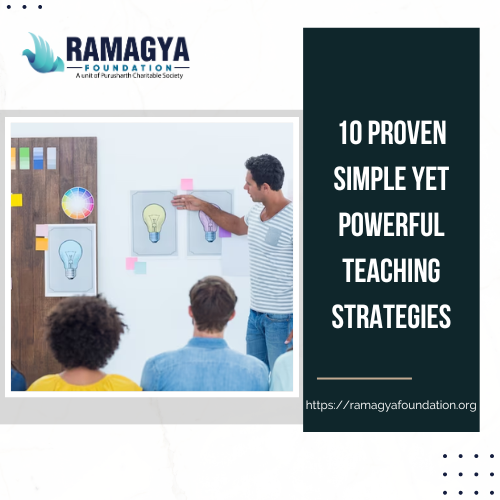
Teaching is an art, and effective teaching strategies can transform the learning experience for students. At Ramagya Foundation, we understand the significance of quality education, especially for underprivileged students.
To support educators in their mission to impart knowledge and skills, we have compiled a list of 10 proven, simple, yet powerful teaching strategies. These strategies are not only beneficial for teachers but also for the students they serve.
- Active Learning
“Learning by doing” is a concept that has stood the test of time. According to educational psychologist Edgar Dale, students remember only 10% of what they read but 90% of what they do. Encouraging active learning methods, such as group discussions, hands-on activities, and projects, can significantly enhance student engagement and comprehension. - Differentiated Instruction
No two students are the same, and recognizing this diversity is critical to effective teaching. The National Center on Universal Design for Learning states that differentiated instruction caters to student’s needs, ensuring each learner can thrive uniquely. - Technology Integration
In the digital age, leveraging technology in the classroom is imperative. A National Association of Independent Schools study found that technology integration enhances students’ problem-solving skills and collaborative abilities. It’s crucial to keep pace with technological advancements and use them to engage students effectively. - Flipped Classroom
The flipped classroom model, as the Flipped Learning Network endorsed, involves students learning content at home through videos or readings. At the same time, in-class time is dedicated to discussions, problem-solving, and practical applications. This approach has been shown to improve student participation and understanding. - Formative Assessment
As highlighted by educational researcher Paul Black, formative assessment is an ongoing process that allows teachers to gather feedback on student learning. Regular quizzes, discussions, and peer evaluations help educators adjust their teaching methods to suit the needs of their students. - Cooperative Learning
“Alone, we can do so little; together, we can do so much.” Helen Keller’s words ring true in the context of cooperative learning. The American Psychological Association[1] found that students who engage in collaborative learning activities perform better academically and develop essential social skills. - Visual Aids and Multimedia
According to the Social Science Research Network, 65% of the population consists of visual learners. Visual aids, multimedia presentations, and infographics can enhance the retention and comprehension of complex topics. - Gamification
Gamification is a powerful educational tool that applies game design elements to non-game contexts. A British Journal of Educational Technology study found that gamified learning can increase student motivation, participation, and knowledge retention. - Metacognition
Encouraging metacognition, the process of thinking about one’s thinking is essential for fostering self-regulated learners. The American Psychological Association suggests that metacognitive strategies, such as goal setting and self-assessment, empower students to take control of their learning. - Emotional Intelligence
The importance of emotional intelligence in education is underscored by a study in the Journal of Educational Psychology, which found that students with higher emotional intelligence tend to perform better academically. Teaching emotional intelligence can enhance students’ self-awareness, empathy, and interpersonal skills.
Effective Teaching Strategies and Stats
“Education is the most powerful weapon which you can use to change the world.” – Nelson Mandela
- According to a National Center for Education Statistics survey, 94% of K-12 teachers in the United States use technology in the classroom.
- A study published in the Journal of Interactive Online Learning found that gamified learning improved students’ performance by an average of 10%.
- The American Psychological Association reports that students participating in cooperative learning activities achieve 77% higher outcomes than those receiving traditional instruction.
“The best teachers are those who show you where to look but don’t tell you what to see.”– Alexandra K. Trenfor
These teaching strategies represent the keys to unlocking a more engaging and effective learning environment for students. At Ramagya Foundation, we firmly believe that quality education is a privilege and a fundamental right for all. Our commitment to this cause is unwavering, especially when it comes to supporting educators who work tirelessly to positively impact the lives of young learners, particularly those from underprivileged backgrounds.
The importance of these teaching strategies cannot be overstated. They are simple and compelling, offering the potential to create a more inclusive, dynamic, and enriching educational experience for students.
As we champion these teaching strategies, we understand that education is not a one-size-fits-all endeavor. We can foster a more inclusive and equitable educational system by embracing diversity and providing the tools and techniques that support a range of learning styles. Our firm belief is that our society’s future lies in the hands of well-educated and emotionally intelligent individuals who can think critically, collaborate effectively, and adapt to a rapidly changing world.
In the spirit of Nelson Mandela’s words, “Education is the most powerful weapon you can use to change the world.” By equipping educators with these powerful teaching strategies and providing the necessary support to underprivileged students, we are shaping the future and helping to create a brighter, more equal, and harmonious world for all.
Ramagya Foundation remains dedicated to this vision, and we stand firmly beside educators as they continue their noble mission of transforming lives through education!
Read our Article: How can Teachers help Students Manage their Exam Stress?